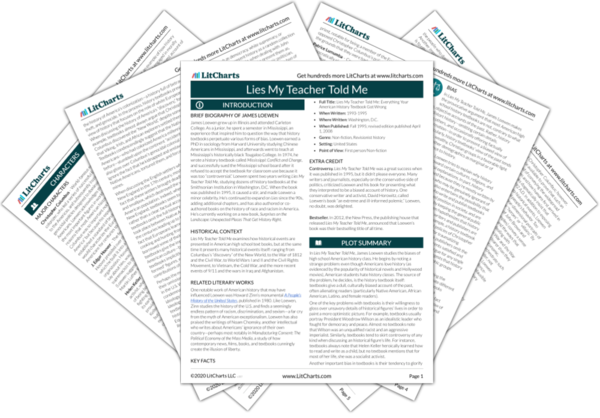Minor Characters
Salvador Allende
Democratically elected president of Chile who, partly because of his socialist views, was assassinated—probably with the help of the CIA—and replaced with an anti-Communist, pro-U.S. dictator.
Osama Bin Laden
Founder and leader of al-Qaeda, the organization that orchestrated the terrorist attacks of September 11, 2001.
John Brown
19th century abolitionist and activist who led a raid on a military base at Harpers Ferry, and was later executed for his crimes. Although history textbooks often paint Brown as a religious fanatic, Loewen argues that Brown was a deeply thoughtful, rational man.
Fidel Castro
Leader of Cuba for most of the second half of the 20th century—in spite of the United States’ dozens of attempts to assassinate him.
Jefferson Davis
President of the Confederacy during the Civil War.
Stephen Douglas
Illinois politician who, in the years leading up to the Civil War, participated in a series of famous debates on slavery with Abraham Lincoln.
Michael Frisch
History professor at the State University of New York at Buffalo.
Freddy Hampton
Black Panther leader who was murdered by the Chicago police department in the early hours of the morning, while he was asleep in his bed.
Prince Henry the Navigator of Portugal
15th century monarch who organized many of the key European expeditions to the Americas.
Carrie Highgate
Black woman who married Senator A.T. Morgan.
Saddam Hussein
Secular dictator of the country of Iraq, who had collaborated with the U.S. during the 1980s, but later refused to grant American companies access to Iraqi oil.
President Thomas Jefferson
Third president of the United States, and an eloquent advocate for the expansion and prolongation of the slave trade in America.
Dr. Martin Luther King, Jr.
Important civil rights leader whose assassination in 1968 may, Loewen argues, have been orchestrated by the FBI.
Henry Kissinger
Secretary of State under President Richard Nixon.
Bartolomé de Las Casas
16th century Spanish historian and priest, notable for being a member of the European elite who opposed Christopher Columbus’s policies in the Americans on the grounds that they were barbaric.
Patrice Lumumba
Congolese politician, and the first democratically elected Prime Minister of the Congo. He was assassinated, probably with the help of the CIA.
A.T. Morgan
White Mississippi senator during the Reconstruction era who married a black woman named Carrie Highgate and was reelected.
Ho Chi Minh
Communist leader who served as the prime minister of North Vietnam during the Vietnam War.
Margaret Mitchell
Author of Gone With the Wind, one of the bestselling books of all-time, despite (or perhaps, because of) the fact that it wrongly characterizes the Reconstruction era as a time of rampant black corruption and incompetence.
Anaïs Nin
French-Cuban writer who wrote, “We see things as we are.”
President Richard Nixon
37th president of the United States, and leader of the country during the end of the Vietnam era, Nixon was the only U.S. president to resign from office, owing to his role in the Watergate scandal.
James Earl Ray
The man who assassinated Martin Luther King, Jr.
Betsy Ross
Revolutionary-era American woman who many students still believe to have sewed the first American flag, despite clear evidence that she didn’t.
Harriet Beecher Stowe
Author of Uncle Tom’s Cabin, one of the bestselling books of all time and a furious attack on the Southern slave trade.
Squanto
Native American who learned how to speak English after being kidnapped by European settlers and sold into slavery.
Harry Truman
33rd president of the United States, who made the decision to drop an atomic bomb on Japan near the end of World War Two.
President George Washington
First president of the United States of America, and—contrary to what many American history textbooks imply—a slave owner.
